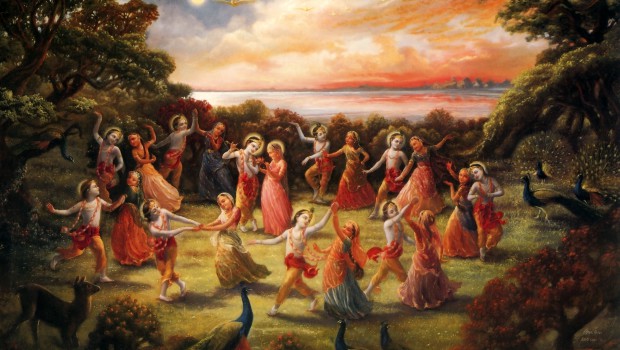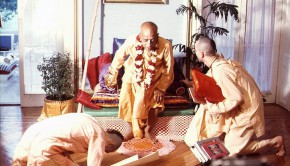Higher Rasa
There are some devotees who say we should pursue a spiritual goal such as to become a gopi, or a gopa, etc., in our next life, etc. I have just heard a statement to that effect recently. Some devotees have been quoted to say that Srila Prabhupada gave the basics and the higher process is to pursue some type of rasa that one is attracted to. Hopefully we can shed light
Srila Visvanatha Cakravarti and Srila Sanatana Gosvami both explain in their commentaries on the 14th chapter of Srimad Bhagavatam, “Prayers of Lord Brahma”, of how Lord Brahma is not presumptuous to think that he could enter into the exalted status of the residents of Vrindavan. Srila Visvanatha Chakravarti comments on text 31 as follows:
(Lord Brahma speaks to Lord Krishna) “However, it is not proper for persons like myself to request the position of Your greatest devotees, who love You in the pure vatsalya-rasa and other exalted rasas. That position is very difficult to attain. My words here are meant only to glorify it.”
Srila Visvanatha Chakravarti also explains how Lord Brahma deems it not proper to request the position of great devotees of Gokula, in exalted rasas such as vatsalya, etc.
“My greatest possible good fortune would be to take any birth whatever in this forest of Gokula and have my head bathed by the dust falling from the lotus feet of any of its residents. Their entire life and soul is the Supreme Personality of Godhead, Mukunda, the dust of whose lotus feet is still being searched for in the Vedic mantras.” (SB 10.14.34)
Similarly Sanatana Goswami explains how Brahma responds to Krishna’s questions as follows:
Lord Krishna may ask: “You prayed to attain any sort of birth where You would be touched by the dust from the feet of Gokula’s residents. Why did you not ask for a birth as a gopa or one of the other devotees there?”
Sanatana Goswami describes further:
“O Lord, the Personified Vedas are the most senior and venerable persons. They are my teachers. If they find it difficult to attain the dust of Your feet, then it is not proper for me to pray as You suggest. How can I pray to become a gopa or other Gokula resident, who have all conquered Your lotus feet by the greatness of their love?”
Srila Sanatana Gosvami explains how even Lord Brahma declines to pray for the position of the great residents of Gokula, such as gopas, etc. He sees how the Personified Vedas even find it difficult to attain the dust of the Lord’s feet. Brahma factually realizes his humble position.
I know that many devotees follow the vani of Srila Visvanatha Cakravarti’s teachings as he is considered to be a bona fide rasika guru. And so I was surprised to read his commentary on Lord Brahma’s prayers. It is quite illuminating to understand that even Lord Brahma would not assume to reach the status of the residents of Vrindavan. He did not consider it proper to even request such a position.
Srila Prabhupada has also stated repeatedly that we should simply follow the process of vaidhi bhakti and realize that we are not this material body. Then our rasa will be revealed to us in due course of time. Here we see this humble mood confirmed by the great acaryas. We cannot force or imitate pure devotional service to appear until it is meant to appear by our mature devotional service and Krishna’s supreme will. First we must realize that “we’re not this material body” and perfect our sadhana bhakti, preach Krishna Consciousness and serve our Guru’s mission. Then eventually our particular rasa will be revealed to us by the grace of guru and Krishna, who have been pleased by our humble service.
We’ve seen time and time again, that some devotee, or some sanyasi had thought that he was qualified and engaged in “higher rasa” when time had told that he was still not sufficient in knowledge that “he was not his body” and he suffered some falldown, due to gross mis-identification with the material body. Srila Prabhupada has tried to spare us from this presumptuous attitude, being the precursor to sahajiyism.
Eternal Constitutional Identity of the Soul
The constitutional spiritual identity (svarupa) and function of the soul is that it is an eternal servant of Krishna. That is the essential characteristic of the soul not the specific rasa (shanta, dasya, sakhya, vatsalya, madurya). Therefore one should always cultivate devotional service to Krishna beginning from regulative vidhi-marga then one’s raga-marga (5 rasas) will develope properly without any separate endeavor. Because raga-marga is on the perfectional uttama-adhikari devotional platform it should never be done presumptuously or immaturely.
“It is the living entity’s constitutional position to be an eternal servant of Krsna because he is the marginal energy of Krsna and a manifestation simultaneously one and different from the Lord, like a molecular particle of sunshine or fire. Krsna has three varieties of energy.” (Caitanya Caritamrta Madhya 20.108-109)
“Srila Jiva Gosvami, in his thesis Bhakti-sandarbha (202), has stated that uncontaminated devotional service is the objective of pure Vaisnavas and that one has to execute such service in the association of other devotees. By associating with devotees of Lord Krsna, one develops a sense of Krsna consciousness and thus becomes inclined toward the loving service of the Lord. This is the process of approaching the Supreme Lord by gradual appreciation in devotional service. If one desires unalloyed devotional service, one must associate with devotees of Sri Krsna, for by such association only can a conditioned soul achieve a taste for transcendental love and thus revive his eternal relationship with Godhead in a specific manifestation and in terms of the specific transcendental mellow (rasa) that one has eternally inherent in him.” (Caitanya Caritamrta Adi 1:35 purport)
“Without serving Krsna according to the vidhi-marga regulative principles of the pancaratrika-vidhi, unscrupulous persons want to jump immediately to the raga-marga principles. Such persons are called sahajiya. There are also demons who enjoy depicting Krsna and His pastimes with the gopis, taking advantage of Krsna by their licentious character. These demons who print books and write lyrics on the raga-marga principles are surely on the way to hell.
Unfortunately, they lead others down with them. Devotees in Krsna consciousness should be very careful to avoid such demons. One should strictly follow the vidhi-marga regulative principles in the worship of Laksmi-Narayana, although the Lord is present in the temple as Radha-Krsna. Radha-Krsna includes Laksmi-Narayana; therefore when one worships the Lord according to the regulative principles, the Lord accepts the service in the role of Laksmi-Narayana. In the “Nectar of Devotion” full instructions are given about the vidhi-marga worship of Radha-Krsna, or Laksmi-Narayana. Although there are sixty-four kinds of offenses one can commit in vidhi-marga worship, in raga-marga worship there is no consideration of such offenses because the devotees on that platform are very much elevated, and there is no question of offense. But if we do not follow the regulative principles on the vidhi-marga platform and keep our eyes trained to spot offenses, we will not make progress.” (Srimad Bhagavatam 4.24.45-46 purport)
“When you are free from the conception of gross and subtle bodies and when your senses are free from all influences of the modes of material nature, you will realize your pure form in My association. At that time you will be situated in pure consciousness.” (Srimad Bhagavatam 3.9.33)
“Purport: In the Bhakti-rasamrta-sindhu it is said that a person whose only desire is to render transcendental loving service to the Lord is a free person in any condition of material existence. That service attitude is the svarüpa, or real form, of the living entity. Lord Sri Caitanya Mahaprabhu, in the Caitanya-caritamrta, also confirms this statement by declaring that the real, spiritual form of the living entity is eternal servitorship to the Supreme Lord.”
Higher Rasa and Lord Caitanya’s Sankirtan Yuga-dharma
Spontaneous Krishna prema can only be awakened by Lord Caitanya’s sankirtan movement of congregational chanting of the holy names. Further, chanting the holy names of Krishna is both the means (vidhi-bhakti) and the goal (raganuga-bhakti) simultaneously. Therefore sankirtan can never be given up whether in the neophyte stage or the perfected stage as it is the means and the goal of spiritual life at the same time.
“It is the nature of the Hare Krsna mahä-mantra that anyone who chants it immediately develops his loving ecstasy for Krsna.” Caitanya Caritamrta Adi 7.83)
Haridasa Thakura protested, “These two benedictions (freedom from the reactions of all sinful life and liberation from material bondage) are not the true result of chanting the holy name. By actually chanting the holy name without offenses, one awakens his ecstatic love for the lotus feet of Krsna.” Antya 3.178
By chanting the holy name of the Supreme Lord, one comes to the stage of love of Godhead. Then the devotee is fixed in his vow as an eternal servant of the Lord, and he gradually becomes very much attached to a particular name and form of the Supreme Personality of Godhead.
As his heart melts with ecstatic love, he laughs very loudly or cries or shouts. Sometimes he sings and dances like a madman, for he is indifferent to public opinion. (Srimad Bhagavatam 11.2.40)
“Similarly, the first hint that offenseless chanting of the Lord’s holy name has awakened dissipates the reactions of sinful life immediately. And when one chants the holy name offenselessly, one awakens to service in ecstatic love at the lotus feet of Krsna.” (Caitanya Caritamrta Antya 3.185)
“The holy name of Lord Rama certainly gives liberation, but the holy name of Krsna transports one to the other side of the ocean of nescience and at last gives one ecstatic love of Krsna.” Caitanya Caritamrta Antya 3.257)
Chanting the holy name is the chief means of attaining love of Godhead. This chanting or devotional service does not depend on any paraphernalia, nor on one’s having taken birth in a good family. By humility and meekness one attracts the attention of Krsna. That is the verdict of all the Vedas. Therefore if one becomes very humble and meek, he can easily attain the lotus feet of Krsna in this age of Kali. That is the fulfillment of all great sacrifices, penances and austerities because when one achieves ecstatic love of Godhead, he attains the complete perfection of life. Therefore whatever one does in executing devotional service must be accompanied with the chanting of the holy name of the Lord.” Bhakti-sandarbha 270
“Following this religious principle, a pure devotee of Lord Krsna always chants the holy name. As a result of this, he gets the fruit of ecstatic love for Krsna.
” (Caitanya Caritamrta Antya 7.108)
Lord Caitanya’s pastimes of chanting the holy names is on the platform of ecstatic rasa in Vraja.
“Sri-gauda-mandala-bhumi. Gauda means West Bengal. Lord Caitanya appeared in West Bengal, Navadvipa, and He especially flooded that part of the country with the sankirtana movement. That part of the country has special significance, for it is nondifferent from Vrndavana. It is as good as Vrndavana. Living in Vrndavana and living in Navadvipa are the same. Narottama dssa Thakura says, sri-gauda-mandala-bhumi, jeba jane cintamani. Cintamani means the transcendental abode. Tara hoy braja-bhume bas. If one simply understands that this land of Navadvipa is not different from Vrndavana, then he actually lives in Vrndavana. One should not think that he is living in Bengal or any material country; the places where Lord Caitanya had His pastimes are as good as Vrndavana.”
“Lord Caitanya’s distribution of this love of God is compared wtih an ocean (rasa-arnava). What kind of ocean? Not the salty ocean that one cannot taste. The water of this ocean is so nice that if one drinks even one drop, he will like it more and more. It is not ordinary ocean water, of which one cannot taste even a drop. Therefore it is called rasärëava. In this ocean there are different waves; an ocean does not stand still, for it is not impersonal or void. And as the ocean is always dancing with waves, similarly the ocean of transcendental love of Krsna as introduced by Lord Caitanya has constant waves, constant sound. One has to dive deep into that ocean. If one knows the secret and says, “Let me dive deep into the ocean of the transcendental loving movement introduced by Lord Caitanya,” he immediately becomes one of the confidential devotees of Radha and Krsna.” (Narottama das Thakura’s Savarana-Sri-Gaura Mahima purport)
From “Nectar of Devotion” chapter 16 Eligibility for Spontaneous Devotional Service
Therefore, in the beginning, everyone should strictly follow the regulative principles of devotional service, according to the injunctions of the scriptures and the spiritual master. Only after the stage of liberation from material contamination can one actually aspire to follow in the footsteps of the devotees in Vrndavana.
A devotee who is actually advanced in Krsna consciousness, who is constantly engaged in devotional service, should not manifest himself, even though he has attained perfection. The idea is that he should always continue to act as a neophyte devotee as long as his material body is there. Activities in devotional service under regulative principles must be followed even by the pure devotee. But when he realizes his actual position in relationship with the Lord, he can, along with the discharging of regulative service, think within himself of the Lord, under the guidance of a particular associate of the Lord, and develop his transcendental sentiments in following that associate.
In this connection, we should be careful about the so-called siddha-pranali. The siddha-pranali process is followed by a class of men who are not very authorized and who have manufactured their own way of devotional service. They imagine that they have become associates of the Lord simply by thinking of themselves like that. This external behavior is not at all according to the regulative principles. The so-called siddha-pranali process is followed by the prakrta-sahajiya, a pseudosect of so-called Vaisnavas. In the opinion of Rupa Gosvami, such activities are simply disturbances to the standard way of devotional service.
Sri Rupa Gosvami says that learned acaryas recommend that we follow the regulative principles even after the development of spontaneous love for Krsna. According to the regulative principles, there are nine departmental activities, as described above, and one should specifically engage himself in the type of devotional service for which he has a natural aptitude. For example, one person may have a particular interest in hearing, another may have a particular interest in chanting, and another may have a particular interest in serving in the temple. So these, or any of the other six different types of devotional service (remembering, serving, praying, engaging in some particular service, being in a friendly relationship or offering everything in one’s possession), should be executed in full earnestness. In this way, everyone should act according to his particular taste.
In Conclusion:
We cannot preach raganuga bhakti (siddha pranali) to attain raganuga bhakti. One must always preach vidhi-bhakti to attain raganuga-bhakti. In other words one should never put the cart before the horse or proclaim the goal (raganuga-bhakti) as more important than the path (vidhi-bhakti) to the goal. That will create unnecessary disturbance and division in the vaisnava community.
This problem is also found in the appointed and voted-in diksa-gurus which can only be attained by perfect qualification and mature devotional service (uttama-adhikari/raganuga-bhakti) only and never by rubber-stamped title alone.














